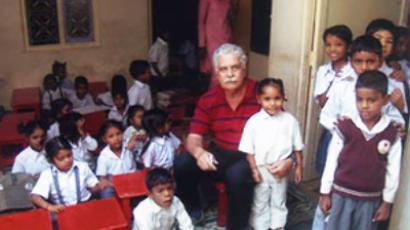Agent Orange still haunting the US
Since the Vietnam War ended and the effects of Agent Orange have become more apparent, many are beginning to look back at the effect it had on the people of Vietnam.
"I was born without legs and missing one hand," said Tran Thi Hoan.
It is because of America’s chemical war against her people in the jungles of Vietnam that Tran is in this condition. She is a victim of Agent Orange, second generation.
"Lots of people are worse than me."
Tran is one of many. Her story represents millions living in the shadows of a lasting legacy.
These children will never live a normal life; their deformities are physical signs of human decay. Although their parents were not even born until after the Vietnam War, 18 million gallons of the toxic herbicide, sprayed through the jungles of South Vietnam, is still penetrating the DNA of those born today.
"There are millions and millions of victims still alive and are suffering from illnesses and from cancers," said Dr. Nguyen Thi Ngoc Phuong, the Director General of Ngoc Tam Hospital in Ho Chi Minh City, Vietnam. Dr. Nguyen is Tran's doctor and accompanied Tran to testify on Capitol Hill.
The US government has acknowledged a connection between Agent Orange and the health defects and ailments that continue to plague the lives of Vietnam War veterans for generations. But the US has refused to make the same link for the millions of Vietnamese War victims whose lives have been devastated as a result of Agent Orange.
This is why delegations are here in Washington following a report issued by lawmakers, scientists and doctors calling on the US government to own up to its Agent Orange legacy in Vietnam today.
RT asked Congressman Tom Rooney, a Republican from Pennsylvania why there isn’t any money dedicated to the Vietnamese who have the same kind of ailments.
"I don't know, I think that is a very important issue and I have a lot of Vietnam War veterans in my districts and I agree, I don't know the answer today," he responded.
Government records show nearly 95 percent of all US Agent Orange related aid is committed to contain and remove dioxin contamination. In fact, the US has been providing medical aid for everything but Agent Orange treatment and medical exploration.
"We ask for justice for all the victims," said Tran.
Those fighting for justice in the case of Vietnamese Agent Orange victims want the physical and psychological damages to be acknowledged.
"If they accept, they have to pay to compensate for millions of people, not only in Vietnam but also in the United States and also to the other countries, like Korea, the Philippines, Australia and New Zealand," said Dr. Phuong.
Jonathan Moore, an attorney from New York, says US chemical companies at the time of the Vietnam War knew the purpose of the Agent Orange they produced. He says they should be held responsible for its impact.
“The Agent Orange – used in Vietnam – that was manufactured by Dow, Monsanto and other chemical companies in the US at the time, contained dioxin rates that were unnecessary and had no effect on the purpose that the herbicides were used for. It wasn’t a defoliant, it was simply a chemical that was created because Dow and Monsanto used a process which even at the time was contrary to industry standards,” Jonathan Moore says. “Any way you look at it – from the moral, or ethical, or legal standpoint, we believe these corporations should be held responsible for the harm they caused because they knew what was going to happen.”
Merle Ratner, from the campaign group Vietnam Agent Orange Relief, says the use of chemicals during the Vietnam War is responsible for an ongoing humanitarian crisis, and that Vietnamese victims should continue to fight for justice and compensation.
“Well, dioxin unfortunately is the chemical that keeps on killing, it's probably the most toxic substance known to science. There are a number of ways that young people who weren't even born during the war have been affected. One is – they may live in a toxic hot spot: they eat the fish, they get into the water. But even more harmful is that it’s also transmitted genetically,” Ratner says.
“We are trying to achieve justice for the victims in Vietnam, we are trying to clean-up the land,” Ratner continues. He says they are also seeking “assistance for the children and grandchildren of US veterans who still suffer from Agent Orange and for the forgotten population – the Vietnamese American kids and grandkids whose parents fought on the US side but have been completely abandoned. So we are here to talk to our legislators, this is an issue that American veterans and the American people in general care a lot about and together we are going to make sure our Congress does the right thing.”
The dark legacy left behind by the US in Vietnam is one with millions of human faces. Their struggle, three decades in the making, will not end with money from the US government, but it could ease the pain the US has been ignoring since it dumped Agent Orange into the jungles of Vietnam.













